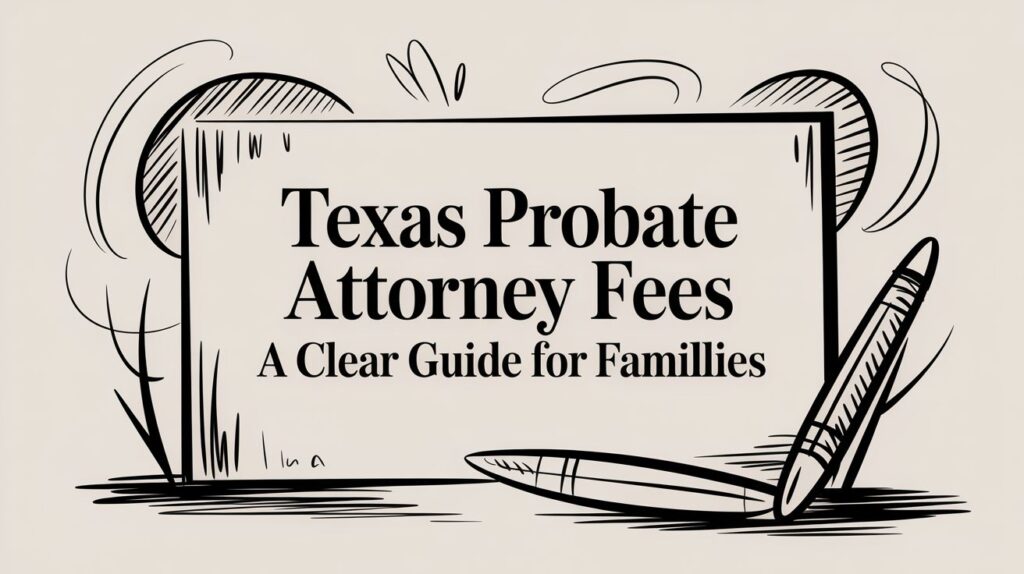If you’ve recently lost a loved one or are preparing your own estate plan, you’ve probably asked yourself, what is probate court in Texas? It’s a common question—and an important one. Probate court might sound like a mysterious, intimidating place, but it’s actually a vital part of how Texas ensures that a person’s final wishes are honored and their estate handled lawfully.
In this guide, we’ll walk you through what probate court in Texas really does. We’ll explain how it works, when you need it, who’s involved, and what to expect whether you’re an executor, heir, or someone contesting a will. Along the way, we’ll include practical examples and advice to help you navigate the process with clarity and confidence.
What Is Probate Court in Texas?
At its core, probate court in Texas is a specialized part of the judicial system that deals with matters related to wills, estates, guardianships, and the legal affairs of deceased persons. This includes determining whether a will is valid, overseeing the administration of an estate, resolving disputes among heirs, and ensuring that creditors are properly paid before distributing assets.
Texas has a unique probate system compared to many other states. While some counties (like Harris, Dallas, Travis, and Bexar) have designated probate courts, smaller counties handle probate matters through county or district courts with probate jurisdiction.
Probate court exists to ensure that the legal rights of the deceased and their heirs are protected, and that estate assets are transferred fairly, according to the law—or the decedent’s wishes.

When Do You Go to Probate Court in Texas?
You typically end up in probate court in Texas when someone passes away and leaves behind property or assets that are not automatically transferred through mechanisms like joint ownership, beneficiary designations, or trusts. For instance, if your grandmother passed away and left a will giving her home to your uncle, that will must be validated in probate court before the title can legally be transferred.
Probate court is also necessary when there is no will at all (dying “intestate”) and the estate must be divided according to Texas law. In both scenarios, someone must step in to manage the estate—either an executor named in the will or an administrator appointed by the court.
Key Roles in Texas Probate Court
Understanding what is probate court in Texas also means knowing who participates in the process. Probate isn’t just about a judge making decisions—it’s a structured legal process with several key players.
The Probate Judge
The probate judge oversees the case, whether it’s approving the will, appointing executors or administrators, handling disputes, or approving the final distribution of assets. In counties with statutory probate courts, the judges may only hear probate and guardianship cases, which can lead to faster resolutions.
The Executor or Administrator
This person manages the estate during the probate process. If the deceased had a will, it typically names an executor. If there was no will, the court appoints an administrator. Either way, their job is to inventory assets, notify creditors, pay valid debts, and distribute what remains to the rightful heirs.
Heirs and Beneficiaries
These are the people who stand to inherit—either named in the will or identified through intestate succession law. Heirs and beneficiaries have rights in probate court, including the right to receive notice of the proceedings and to contest the will if necessary.
Probate Attorneys
In many cases, a lawyer represents the estate or individual parties. While not always required, having a probate attorney can help navigate complex paperwork, court filings, and potential disputes.

Types of Probate Proceedings in Texas
Probate court in Texas isn’t one-size-fits-all. Depending on the situation, there are different types of proceedings. Choosing the right one can affect how much time and money the estate spends on legal matters.
Independent Administration
This is the most common and efficient probate process in Texas. If the will allows—or if all heirs agree—the executor can manage the estate without needing constant court supervision. The court’s role is limited to opening the probate and closing it once everything is complete.
Independent administration saves time, reduces legal fees, and is often recommended when the estate is straightforward and there is minimal conflict.
Dependent Administration
When heirs cannot agree or if the will doesn’t allow independent administration, the court becomes more involved. The executor must request court approval before taking many actions, such as paying debts or selling property. This offers more court oversight but increases time and cost.
This option is often chosen when there’s a lack of trust among heirs or when litigation is likely.
Muniment of Title
If there is a valid will and no debts (other than a mortgage), probate court in Texas allows a shortcut: the muniment of title. This is a simplified process where the court admits the will as evidence of title transfer—no executor is appointed, and no administration is required.
This method is ideal for estates that include real estate and don’t require complex administration.
Small Estate Affidavit
If the estate’s value (excluding homestead and exempt property) is less than $75,000 and there’s no will, a small estate affidavit may allow heirs to claim property without going through full probate.
This form is filed with the court and, if approved, serves as legal proof of ownership for heirs to use when claiming assets.

Real-Life Example: Probate in Travis County
When James passed away in Austin, he left behind a will naming his niece Emma as executor. His estate included a house, a car, and a few investment accounts. Emma filed the will in Travis County probate court and requested independent administration.
Because James’s will explicitly allowed it, the judge approved Emma’s request. She hired a probate attorney to help file the inventory, notify creditors, and transfer the home’s title to the designated heir. The court only needed to sign off at the beginning and end of the process. Everything else moved smoothly and privately.
Emma’s case shows how probate court in Texas can work efficiently—especially when a valid will is in place and family members cooperate.
What Happens at a Probate Court Hearing?
A big part of understanding what is probate court in Texas is knowing what actually happens when you walk into the courtroom. Probate hearings are usually not dramatic courtroom battles like in TV shows—they’re often brief and procedural.
Here’s what to expect at a typical probate court hearing:
- The judge reviews the will and confirms its validity.
- The judge appoints the executor or administrator.
- The executor may be asked to swear an oath and post a bond (unless waived).
- If anyone objects to the will or the appointment, they can raise those issues.
If the court finds everything in order, it issues “letters testamentary” or “letters of administration”—documents that give the executor legal authority to act on behalf of the estate.
Common Issues Probate Court in Texas Handles
While most probate cases are routine, sometimes things don’t go as planned. Here are some of the more contentious issues that probate courts often resolve:
Will Contests
A family member may argue that the will is invalid due to undue influence, lack of capacity, or fraud. The probate court must evaluate evidence and make a ruling, which can delay the estate’s distribution.

Disputes Over Property
Sometimes heirs argue over who gets what—especially when the will is vague or property values are disputed. The court may need to interpret the will or order property to be sold and proceeds divided.
Executor Misconduct
If heirs believe the executor is mismanaging the estate, they can ask the court to remove them. Probate court then reviews the claims and can appoint a replacement if necessary.
Creditor Claims
Probate court in Texas also oversees disputes between estates and creditors. If a creditor files a claim that the executor rejects, the court will decide whether the debt must be paid.
How Long Does Probate Take in Texas?
The timeline for probate varies. Simple cases with independent administration may wrap up in six to nine months. More complex or contested cases—especially those with dependent administration—can last a year or more.
Here are a few key milestones:
- Filing the will and opening probate (within four years of death)
- Court hearing to approve the executor
- Inventory and appraisal of estate assets (within 90 days)
- Notification to creditors and settlement of debts
- Distribution of remaining assets
- Filing of final report and closing the estate
The court’s role is to make sure all these steps happen lawfully and fairly.
Does Every Estate Go Through Probate in Texas?
No, not every estate must pass through probate court in Texas. Certain assets transfer automatically upon death and avoid probate altogether:
- Life insurance with named beneficiaries
- Payable-on-death (POD) bank accounts
- Transfer-on-death (TOD) deeds for real estate
- Joint accounts with right of survivorship
- Assets held in a revocable living trust
Proper estate planning can minimize the need for probate, which is why many families work with estate attorneys long before probate ever becomes necessary.
Final Thoughts: Why Probate Court in Texas Matters
So, back to the question—what is probate court in Texas? It’s the legal system’s way of managing what happens after someone dies. It validates wills, ensures fair asset distribution, protects the rights of heirs, and resolves disputes that can otherwise tear families apart.
While the term “probate court” may sound intimidating, the process is there to provide structure and clarity at a time when people are dealing with grief and uncertainty. With the right planning and guidance, Texas probate court doesn’t have to be overwhelming. In fact, it can be a respectful and efficient way to honor someone’s legacy and make sure their final wishes are carried out.








